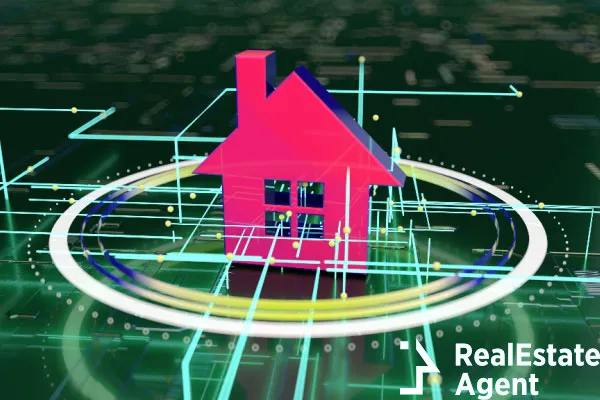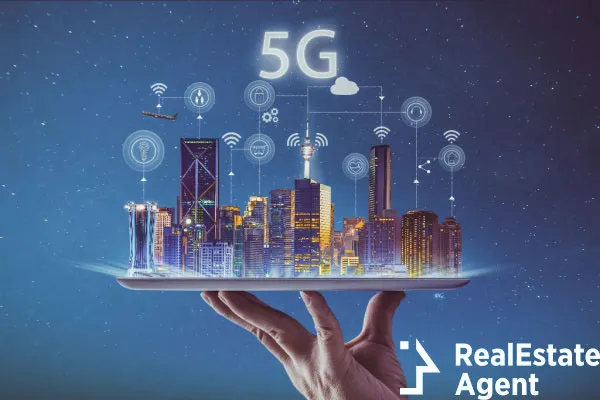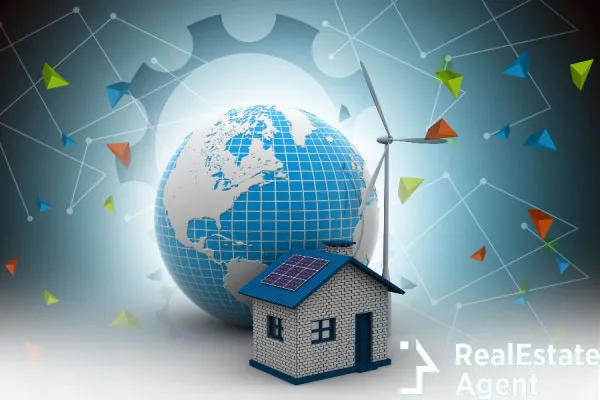
Saying that today's world is vastly different from the world most of us grew up in is an understatement. Still, even if we look back 5 or 10 years from now, our daily lives were vastly different then than they are now. That is the result of technological advancements that trickled down into every aspect of our lives. From how we do our jobs to how we look for a home, technological advancements influence our daily activities. In this article, we aim to explain how technology is changing the real estate industry, the role real estate technology plays in improving your real estate game, and the experience of your clients.
With significant tech growth, it was time industry experts took a closer look at the vast applicability of this technology in the real estate world. The possibilities to connect with clients are endless through 5G interconnectivity, streamlined tech ecosystems being implemented in business, and the continuous development of artificial intelligence.
How Technology is Changing the Real Estate Industry?
But what is this real estate tech we keep hearing about, and how can real estate technology trends help your business? Well, real estate technology has been around for a while, from social media to virtual signatures and everything else in between. Still, the past few years have seen an increase in applicability through various means. The direction it's being taken on right now encompasses CRMs, document management, marketing, lead generation, title, e-signature, VR, QR, and more within real estate technology. This aims to make information easier to access by real estate agents, realtors, brokers, buyers, and sellers alike. Time is one of our most valuable resources, and saving as much as possible while also improving business efficiency is designed to help you improve your game in the real estate industry.
What you apply to your brand is entirely up to you, but improving your visibility in the online tech world will only benefit you. Implementing these real estate technology trends requires some form of investment, but how much you invest is up to you. You can do it all yourself and manage things accordingly or collaborate with freelancers or other business professionals.
The only thing essential for you to apply real estate technology within your brand is your openness toward technology. The truth of the matter is that with how fast things are changing, evolving, and growing around us, keeping up with real estate technology trends may be a challenge until you get started, but once you do, it’s easy to keep up with it as long as you remain informed. Furthermore, going against these trends will result in being left behind.
Technology and innovation are a part of our world, and living in the modern world requires us to have an active online presence. Here we aim to teach you how to use this technology to your benefit and make it more efficient for both you and your clients.
Real Estate Technology Trends

It is already established that technology's essential aspect is improving our lives. Technology grows to satisfy our needs from time-saving to efficiency and using the best methods at your disposal to accomplish your goal. While 20 years ago, a real estate agent's most expensive and efficient tool was a tv spot that reached local audiences, now the world is our oyster, and we can reach the globe with a Tweet. To say that our reality changed is barely scratching the surface.
In real estate technology trends, we saw a direction towards making all information available through spaces and environments that anyone can access. Platforms such as Homes[dot]com, CoStar, Apartments[dot]com, Homesnap, and RealEstateAgent[dot]com try to connect as many dots from the real estate industry as possible to simplify transactions and access to information. Furthermore, the industry is focusing on the internet of things (IoT), blockchain, big data, and drones to provide easy access to all the information related to a property.
The year 2022 came with some heavy changes, and technology can help us move towards a more sustainable future. With Web3 innovations reinventing our online presence, there are a few things to consider for future real estate technology trends.
Web3 in Real Estate
Those under the age of 35 who grew up with the emergence of modern technology are more responsive to a faster time frame for everything. Be it the 6-second videos that decrease attention spans or the insurmountable amount of information at their fingertips; the truth is that real estate transactions are tedious. From the moment your mortgage is approved to the closing date, it can be up to 16 weeks.
That period isn’t only problematic because it’s too long but also involves many entities, hoops you need to jump through, and financial resources as each of those entities are taking their own cut. Regarding affordability in the real estate market, the largest demographic of buyers face severe difficulties in the financial aspect of housing. The aim is to make it so that affordability is less of an issue. The need for an “easy buy” button that fixes these issues is detrimental for the next decade in the real estate market, and it can be provided through the broad Digital Real Estate ecosystem and systems such as NFTs.
Real Estate NFT

Before we explain how real estate NFTs can be the key, let’s understand what an NFT is. Non-fungible tokens, or NFTs, are a new type of digital token that can be purchased with cryptocurrency. An NFT is different as it provides sole ownership of digital assets through blockchain technology. NFT applications can so far be linked to selling digital art and music.
The real estate NFT application takes the capabilities of NFT to other dimensions. Slowly, NFTs are being used to represent ownership of physical assets on blockchain networks. This makes NFTs ideal for real estate transactions by clearing up the process through a safe and flexible environment. Essentially, the seller will sell the NFTs representing their property with all the information and legal data associated with the property. The buyer will gain complete ownership of the property through the NFTs they purchase.
Some challenges are in place with this new technology being adapted throughout the real estate industry as blockchain and NFTs unbalance the status quo of many title company intermediaries. Still, by cutting the middleman, the benefits will reach both parties in the transaction. While this is what the real estate market could evolve into, this trend faces many challenges as cryptocurrencies are used in speculation more than anything else. Applying this would need severe market changes and a general understanding of how they work for everyday consumers.
Blockchain Technology in Real Estate
As the old world of the real estate industry, filled with its rules and regulations determined by courts and judges, is giving way to the new and digital age, property ownership will change. Through blockchain technology, we would be able to swiftly trade ownership with less to no paperwork, lower expenses, and bureaucracy. So far, everything seems perfect.
The reason why blockchain is making its way into the real estate industry is because of the way it works. Digital transactions or blockchain transactions are recorded in a public ledger distributed across a network of computers and can not be controlled by any individual authority. The network of computers verifies the security of the transaction, allowing them to be fully transparent and unalterable, making blockchain transactions ideal for real estate transactions. We are used to several stages of the selling process, several entities that need to give their go-ahead, vetting systems and verifications that all prologue the process and make it more expensive.
If applied, blockchain technology can simplify and streamline real estate transactions by increasing security and reducing fraud instances. Blockchain-based platforms will make it easier for sellers and buyers to find each other and process transactions in a matter of minutes, not weeks or months. Furthermore, the idea of fractional ownership will give more people the opportunity to invest in real estate, possibly bringing the real estate market into the age of democracy.
5G in Real Estate

While the previous two technologies will likely transform the real estate market from the perspective of transactions and market changes, the following two aim to be used by real estate agents when working with buyers and sellers during the transaction process. This technology will increase connectivity by taking internet speed to new levels. For instance, if you want to download a 3-gigabyte DVD-quality movie through 4G, it will take you 8.6 minutes, but with 5G, the download will take around 2.6 seconds.
This technology will increase speed and enable the next generation of connectivity with the next wave of device innovation. It will trickle down into every aspect of our lives and every industry, including real estate, and will innovate everything through its application. Regarding real estate, 5G will make smart homes even smarter by removing latency and overload issues with 4G. Furthermore, by coupling 5G with AI, the software will be able to identify features and amenities in a home from a photograph or video. Augmented reality will also be improved, and the sky will be the limit, with clients being able to virtually see and make any changes in real-time through AR technology. On the topic of the sky, there is an ongoing debate over whether airport towers will be affected by this technology by those using 5G and living in proximity to airports.
When it comes to coverage, the 5G aim is to offer the same internet speed in rural areas as in large metropolitan areas, making remote work more accessible to any area. Through 5G, self-driving cars will have the ability to communicate instantaneously, giving access to traffic-related information faster and allowing commuters to multitask while getting to and from work. The technology is still in development. Even if you have heard of it and see the signal icon on your phone with the 5G beneath it, it’s all about the infrastructure coverage available now. Right now, it feels like you're driving a Lambo in rush hour traffic. You can’t actually see what it can do.
Artificial Intelligence in Real Estate

Artificial intelligence technology took the world by storm and is still developing and growing at such speed that personal use and professional applications are proving not only fun but also incredibly efficient. We already mentioned above how we could develop software to identify home features and amenities from photos and videos, which only underlines how this technology will get stronger, smarter, and more universal in the near future. If you’re wondering how AI technology is changing the real estate industry, look no further than the leverage it already has on the market.
The simplest example of how AI is already used in the real estate industry is the world-famous “Zestimate” from Zillow. Since its implementation in 2006, “Zestimate” has come a long way, and it’s reported that in 2022 alone, Zillow, through the use of machine learning algorithms, tracks and analyses almost 100 million homes. Between 2006 and now, the AI in Zestimate has changed and developed from having thousands of algorithms running simultaneously to only using one neural network that decreased errors in price estimations by a large percentage.
While this example works amazingly for Zillow, realtors can’t use it for their own purposes, but AI as a concept is available for individuals to implement in their jobs. Smart and simple search algorithms can be implemented to cover the data analyses that a team of agents would otherwise do. Unlike knocking on doors and talking to each individual homeowner, this can be done more efficiently through AI. This technology saves a lot of time and effort, and information like time of sale, rates of homes, and how much people live in a home are easily collected and analyzed.
Fears are expected with automation, especially when some of these automated functions can replace the need for workers. Still, it’s more efficient to have an algorithm do something than a human. Workers in all professions could use the efficiency of these AIs to improve, expand and increase profits while focusing on those aspects of their work that an AI can not do. For real estate agents, this means networking and improving their client-agent relationships. A machine will never take over the human element of real estate because some things are yet to be implemented within these technologies, and it’s unlikely that they ever will be. However, using technology to simplify your job by having all the grunt work taken care of should not be seen as a drawback but a step towards increased productivity and profits.
Real Estate Technology and the Future of the Real Estate Industry

Considering everything we covered so far in this article, you can’t help but think about how much the real estate industry is likely to change. Will your job be affected by these changes? Will you be able to keep up with the evolving technology and its implementation in every facet of your work? No one but yourself can answer those questions. While going against these trends will affect your business’s revenue, it’s not only about your work. Like everyone got familiar with smartphones in the late 2000s, these new technologies will be implemented in everything we do, regardless of our job description, line of work, or technical abilities. Knowing how to use Twitter doesn’t mean understanding how every algorithm within the platform works. You use it, and the algorithm does its job to give you access to things you are interested in, promote your interests, and your tweets to those interested in them.
The real estate technology trends we covered above seem out of a sci-fi movie right now. Some of them will catch the attention of various industries. Others might fizzle out, while there are those that are already in use, whether we are actively aware of it or not. For instance, the fact that platforms such as Realtor[dot]com, HomesDatabse[dot]com, Homefinder[dot]com, and ListingBook[dot]com allow buyers to register and make their agents aware of the properties they are interested in is one such technology. Communication and networking between agents and clients are simplified and maximized for the benefit of both parties. Also, real estate agents can promote their properties without being limited to one platform, making them more accessible to those interested in them. We are well past the age when each realtor held on to every property and only made them accessible to their clients. Now, a client can go on Realtor[dot]com, find the property they like, take a virtual tour, scan the QR code and get every bit of information related to the property without using an agent. But while blockchain and NFTs still have a way to go before they are integrated into the industry (if they ever will be fully integrated), some are here now and are available for anyone with access to them.
Realtors Property Resource

A true game-changer for the real estate industry was created by the National Association of Realtors (NAR), and it’s available to all registered member agents. The platform’s exclusivity comes from the association’s exclusivity and strict conduct rules, underlining the quality of services provided by those who are members as it gives them access to everything. And when we say everything, we mean everything as it is the “single largest property-centric database in the country,” according to Dale Ross of Realtors Property Resource.
Providing information about over 147 million parcels, Realtors Property Data covers every possible resource of data related to these parcels, giving realtors access to information that goes beyond what the property seller knows about their property. This database will go further than what Trulia and Zillow currently offer by firstly, making it accessible from Multiple Listing Service and, secondly, including information from 12 other databases. Before you start thinking about privacy of information, think back to disclosure agreements and how troublesome they can be for the buyer if they aren’t truthful.
Through this database, member realtors will be able to be constantly updated about changes in any specific area regarding job growth, planned expansion projects, trends, education system data, property records, and unemployment rates. With this information, it will be easier to predict which areas will grow more, what the impact of that growth will be, and inform their clients better about their expectations regarding a neighborhood or another. One such automation will be valuation models that sellers can consider as they put their homes on the market as underwriters will take these into consideration. Seeing as these metrics will be incredibly accurate and constantly updated, it’s easy to understand the appeal for both agents and clients.
Conclusion
When it comes to cryptocurrencies at the current moment in time, they are seen more as a speculative game than a financial asset. Regardless of what the future will look like, cryptocurrencies are unlikely to be able to replace currencies as a decentralized cryptocurrency won’t be able to make it out alive in a system of government that likes to control their currencies. In the short run, speculation can bring profits, but in the long run, China and India already banned cryptocurrencies, and El Salvador was sucker-punched due to crypto investments.
Still, the real estate industry is and will be heavily impacted by these technology trends. Using them and implementing them within your work will prove beneficial. However, if you decide to swear off technology, you’ll find it might become challenging to activate as a real estate agent, even in the smallest of rural communities. The world is changing at a rapid pace. While it will be easier for some to keep up with the ever-evolving technologies, others might find it difficult to tag along. Still, those are the benefits and disadvantages of technological advancements. They happen fast, and boarding the train late is better than being the only one left in the station.
Let us know in the comments section below if these real estate technology trends are exciting or controversial. I, for one, find it hard to believe that NFTs, crypto, or blockchains will really be implemented to cover the entirety of the real estate market. Still, crazier things became a reality, so who am I to make such predictions? I can say that some of these trends are already shaping the real estate market, so Like & Share this with fellow real estate agents so we can get the word going and keep everyone in the loop. No one gets left behind by the real estate tech trends train of 2022.
















Have a question or comment?
We're here to help.